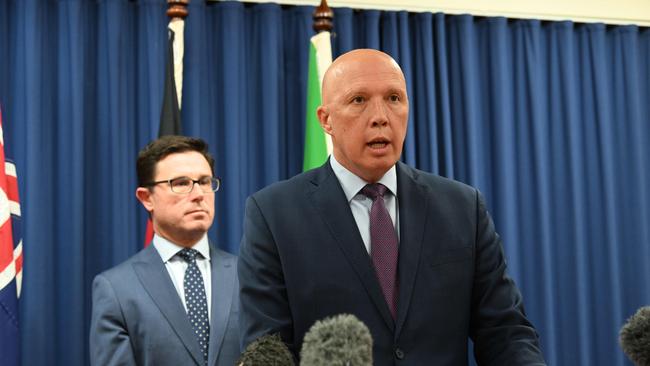The No camp is playing politics, and offers nothing to improve the lives of Indigenous Australians


The referendum on October 14 to amend the Constitution would establish an advisory body made up of Indigenous Australians to advise on matters that affect Indigenous Australians. The purpose is to provide recognition of the First Australians in the founding document of the nation and establish a mechanism so their advice can be heard to improve policy outcomes.
The concept is modest and simple. It was proposed in the Uluru Statement from the Heart (2017) after extensive consultation with Indigenous Australians. It is not legally risky or with unknown consequences. The voice is an advisory body with zero power. It cannot veto or change laws, initiate programs or spend money.
It is up to the parliament, the elected representative body of all Australians, to decide how the voice is constituted, how it would operate and how it would provide its advice. This is important because if it is deemed not to be working effectively, then it can be changed. The authority of parliament is undiminished.
The No camp says we do not know how the voice will work. Yet the Referendum Working Group design principles explain that its members will be chosen by Indigenous Australians, it will be a representative national body, it will include youth and be gender-balanced, it will be accountable and transparent, and work alongside existing organisations.
The voice would not open up endless litigation through the courts. Former High Court chief justice Robert French said there is “little or no scope for constitutional litigation”. The vast majority of constitutional scholars, lawyers and legal societies agree. Parliament and government will be under no obligation to follow or respond to that advice.
The voice enables policymakers to receive advice from the ground up, aimed at closing the gap on the employment, education, housing, health, justice and safety outcomes between Indigenous and non-Indigenous Australians. Enshrining it in the Constitution means it cannot be abolished but it can be altered to work better. Adopting the referendum does not mean a treaty or compensation will follow. These are red herrings from the No campaign.
The No camp claims the referendum will insert race in the constitution. Yet it already refers to race in sections 51 (xxvi) and 25. The voice is not racially divisive; it is about recognising First Australians. It does not grant special privilege or class of citizenship as all Australians can make representations to parliament and government. In legal judgments, laws and programs we have long recognised the traditions and cultures of the First Australians.
The No campaign, as I have argued, is riddled with incoherence and inconsistency. Whether it is Warren Mundine or Peter Dutton or David Littleproud, they see only an opportunity to inflict political damage on Anthony Albanese and his government.
Littleproud opposed the referendum before the referendum question was announced. Mundine supports a treaty; Dutton does not.
Dutton has been confused about the voice. He supports local and regional voices but not a national voice. This makes no sense. His MPs have said the Liberal Party supports a national legislated voice. His party is riven with division, with many current and former leaders, deputy leaders, state leaders and MPs supporting the referendum.
The Opposition Leader supports a second referendum to add a statement of recognition of the First Australians in the Constitution. What is the statement? What is the referendum question? When would it be put? He said at the weekend it was Liberal policy taken to several elections. If so, why did the previous government do nothing about this for nine years?
Moreover, how would this symbolic reconciliation improve the lives of Indigenous Australians? How would it ensure they are better educated, have improved health outcomes and housing opportunities, and help end substance abuse, welfare dependency and violence?
Nice words in the Constitution would achieve nothing. What happened to practical reconciliation? Dutton has not listened to Indigenous Australians.
The Coalition and the No camp offer nothing to improve the lives of Indigenous Australians. It is an abrogation of leadership. They have no detailed and agreed alternative proposal to close the gap for Australians to consider. Zero. Zilch. Zip. They would junk almost two decades of work across multiple governments for political purposes.
What’s more, the No camp is undermining the Australian Electoral Commission. Dutton claimed the referendum was “rigged”. This is straight from the playbook of Donald Trump, who tried to overturn an election and incited a deadly and destructive riot. It must be called out. It is a slippery slope when political leaders attack independent electoral institutions.
A valid vote in the referendum requires yes or no to be written. But a tick, signalling affirmation and approval, is also accepted as a Yes vote. An ambiguous cross is not. It was the same when the Howard government put the republic referendum in November 1999. Nothing has changed. The silliness over ticks and crosses is another attempt by the No camp at misinformation.
The decision Australians will make on October 14 is a profound one. The voice represents no threat to our political or legal system. It is a simple, straightforward, rational and logical change to the Constitution. It asks only that the First Australians be heard; nothing more than that. We gain much and risk nothing by voting yes.
If we vote no, then nothing will change for Indigenous Australians. If we vote yes, we will have an opportunity to embrace a future, together, with reconciliation and responsibility, that will be unifying for Australia. We cannot afford to miss this generous opportunity presented by the First Australians to all of us.



For those who are undecided about whether to vote yes or no for an Aboriginal and Torres Strait Islander advisory body to parliament and government to be enshrined in the Constitution, it is necessary to navigate the thicket of deliberate misinformation and outright falsehoods propagated by those who are opposed to it.